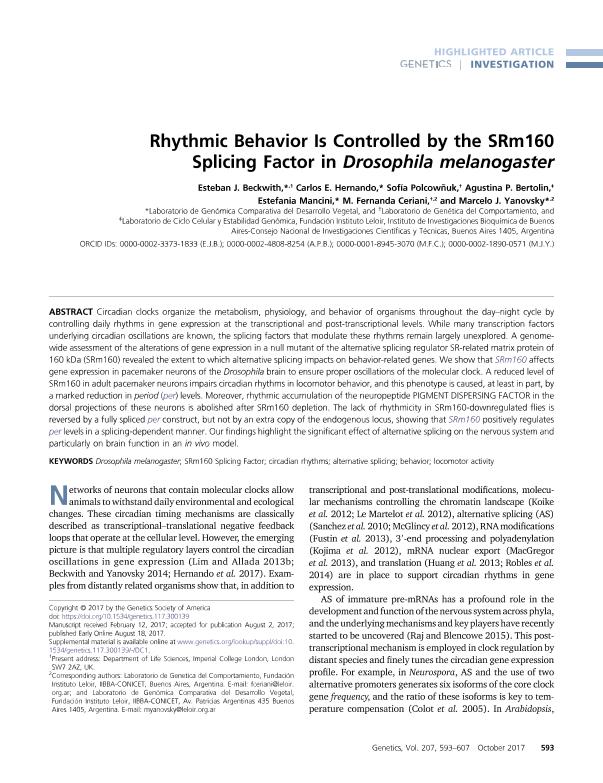Artículo
Rhythmic behavior is controlled by the SRm160 splicing factor in Drosophila melanogaster
Beckwith, Esteban Javier ; Hernando, Carlos Esteban
; Hernando, Carlos Esteban ; Polcowñuk, Sofía
; Polcowñuk, Sofía ; Bertolin, Agustina Paola
; Bertolin, Agustina Paola ; Mancini, Estefania
; Mancini, Estefania ; Ceriani, Maria Fernanda
; Ceriani, Maria Fernanda ; Yanovsky, Marcelo Javier
; Yanovsky, Marcelo Javier
 ; Hernando, Carlos Esteban
; Hernando, Carlos Esteban ; Polcowñuk, Sofía
; Polcowñuk, Sofía ; Bertolin, Agustina Paola
; Bertolin, Agustina Paola ; Mancini, Estefania
; Mancini, Estefania ; Ceriani, Maria Fernanda
; Ceriani, Maria Fernanda ; Yanovsky, Marcelo Javier
; Yanovsky, Marcelo Javier
Fecha de publicación:
10/2017
Editorial:
Genetics Society of America
Revista:
Genetics
ISSN:
0016-6731
e-ISSN:
1943-2631
Idioma:
Inglés
Tipo de recurso:
Artículo publicado
Clasificación temática:
Resumen
Circadian clocks organize the metabolism, physiology, and behavior of organisms throughout the day–night cycle by controlling daily rhythms in gene expression at the transcriptional and post-transcriptional levels. While many transcription factors underlying circadian oscillations are known, the splicing factors that modulate these rhythms remain largely unexplored. A genome-wide assessment of the alterations of gene expression in a null mutant of the alternative splicing regulator SR-related matrix protein of 160 kDa (SRm160) revealed the extent to which alternative splicing impacts on behavior-related genes. We show that SRm160 affects gene expression in pacemaker neurons of the Drosophila brain to ensure proper oscillations of the molecular clock. A reduced level of SRm160 in adult pacemaker neurons impairs circadian rhythms in locomotor behavior, and this phenotype is caused, at least in part, by a marked reduction in period (per) levels. Moreover, rhythmic accumulation of the neuropeptide PIGMENT DISPERSING FACTOR in the dorsal projections of these neurons is abolished after SRm160 depletion. The lack of rhythmicity in SRm160-downregulated flies is reversed by a fully spliced per construct, but not by an extra copy of the endogenous locus, showing that SRm160 positively regulates per levels in a splicing-dependent manner. Our findings highlight the significant effect of alternative splicing on the nervous system and particularly on brain function in an in vivo model.
Archivos asociados
Licencia
Identificadores
Colecciones
Articulos(IIBBA)
Articulos de INST.DE INVEST.BIOQUIMICAS DE BS.AS(I)
Articulos de INST.DE INVEST.BIOQUIMICAS DE BS.AS(I)
Citación
Beckwith, Esteban Javier; Hernando, Carlos Esteban; Polcowñuk, Sofía; Bertolin, Agustina Paola; Mancini, Estefania; et al.; Rhythmic behavior is controlled by the SRm160 splicing factor in Drosophila melanogaster; Genetics Society of America; Genetics; 207; 2; 10-2017; 593-607
Compartir
Altmétricas



